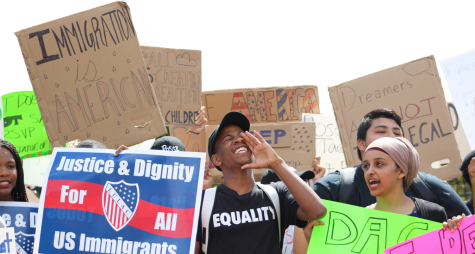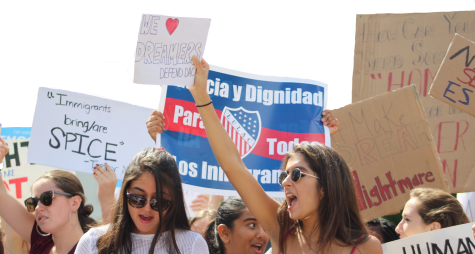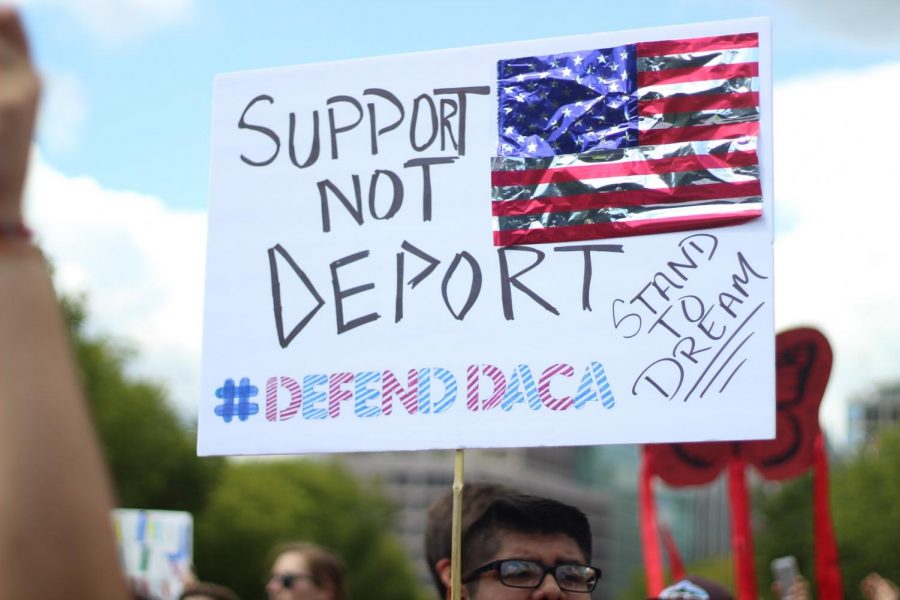Doomed DREAMers
What are colleges doing for undocumented students?
Photos by Melany Rochester
Education was one of the reasons Derian Luna’s parents brought him to the United States. Now a freshman at the University of Nevada – Las Vegas, Luna is working hard to achieve his and his parents’ goals. Unlike most freshman, Luna has an added pressure — he’s a DREAMER.
For years, the lives of almost one million DREAMERs have been a political hot potato tossed between Congress and the president. Each side insists something must be done for this group of people who came to the US without proper documents when they were young, but neither side has produced any solutions to address the issue.
The greatest progress for these young people has been the Deferred Action for Childhood Arrivals (DACA) program implemented by President Obama in 2012. DACA gives DREAMERs a work permit and a promise to keep them in America as long as they are in the program, which they have to reapply for every two years. Under the program, recipients can’t apply for permanent residency or US citizenship, but DACA adds a layer of security that recipients trust to keep them safe. Or it used to.

This protection was destabilized on Sept. 5 when the Trump administration announced it would begin phasing out DACA in six months, tossing the DREAMERs issue back to Congress. While congressional representatives from Speaker Paul Ryan to Sen. Maxine Waters have spoken out in support of DREAMERs, no substantial policy has been voted on, or even proposed, since the September announcement.
A tweet by President Trump hours after the announcement reassured DREAMERs he would revisit the issue if Congress failed to solve it, but his promise seemed as unpredictable as their futures.
For Luna, the announcement put his view of college into perspective.
“It was more of a feeling of working hard in vain, feeling hopeless,” Luna said. “I can still go study, but I won’t be able to work anymore [once DACA expires]. After I graduate, I still won’t be able to work with my degree, so going to college would basically be a waste of time here in the US.”
While DREAMERs are being abandoned by the government, many colleges have pledged their support. In the months following Trump’s election, 28 colleges declared themselves “sanctuaries” for their undocumented student populations.
—

Along with thousands of other colleges across the nation, American University offered a general statement of support and protection for undocumented students, but didn’t label itself a sanctuary. A request for the sanctuary label was made in a November 2016 petition after Trump became President-elect. The petition was signed by 314 AU staff and faculty members, but was rejected by former President Kerwin.
Current AU President, Sylvia Burwell, released a memorandum following the Trump administration’s announcement, promising the university will remain “committed to our undocumented students and will use every legal means at our disposal to offer our support and protection.” Burwell clarified that AU doesn’t label itself as a sanctuary since the term has no legal weight.
In her memo, Burwell listed the Center for Diversity and Inclusion (CDI) as the first point of contact for undocumented students needing resources. Sara Bendoraitis, Director of Programing, Outreach and Advocacy for CDI, said the center acts as an extension cord between the services and offices on campus.
“We have our hands in a lot of different places,” Bendoraitis said.
The office works with students to help them navigate through barriers, where possible, and tries to remove those barriers all together. Bendoraitis reaffirmed that CDI was there to offer support and a place for conversation for undocumented students as they would any other student on campus.
Fanta Aw, Ph.D., Vice president of Student Life at AU, said that most of the students come to her with concerns for their extended family. Whether it’s for themselves or their family, students can speak to the dean of students, the counseling center, Academic Support and Access Center, or any other confidential resource provided to seek assistance or support.
“They can rest assured that their information is left confidential,” Aw said. “We want to make sure that students feel supported to remain here and continue with their semester with the least distractions possible.”
On-campus resources like Aw and Bendoraitis can connect students to more options off-campus. After the Trump administration’s DACA announcement, Aw worked with the Immigrant Law Clinic at the Washington College of Law to provide an informational briefing on what the announcement meant to those who are undocumented or have undocumented family members.
The Immigrant Law Clinic remains available to students who seek immigration help, Aw said, providing students with networks, referrals, and resources. These resources include pro bono lawyers and organizations in D.C. that are available to help undocumented immigrants.
“We have the benefit that we are in Washington where the resources are tremendous,” Aw said.
Bendoraitis estimated that the undocumented population makes up less than five percent of students enrolled at AU. She suggested the low number comes from the cost of the school and limitation of aid that can be given to DACA recipients. Aw says students aren’t required to disclose their immigration status so there is no way to know the exact number of DREAMERs at AU.
Undocumented students are unable to fill out FAFSA or receive federal aid or loans. They are also unable to receive need-based aid through AU grants because AU uses FAFSA to calculate how much aid to give each student. Without being able to verify tax forms and other documents with FAFSA, AU can’t confidently know how much aid a student needs, according to Aw.
While other schools, like the University of Nevada in Las Vegas, have applications other than FAFSA to determine need-based aid for both international and undocumented students, AU isn’t exploring that option right now, Aw said.
“But it doesn’t mean that it won’t change in the future,” she added.
For now, however, undocumented students at American must fund their education through scholarships and personal finances.
—
The financial burden is different for undocumented students at California universities. The California Dream Act, passed in 2011, allows undocumented and nonresidential students to receive scholarships funded through public universities, state administered financial aid and certain grants. The Berkeley Undergraduate Dream Act Aid is financial aid specifically for undocumented students.
The University of California – Berkeley used the California Dream Act to create the Berkeley Undergraduate Dream Act Aid and a work study program to specifically help undocumented students fund their Berkeley education. In 2010 students from the UC-Berkeley Immigrant Student Issues Coalition presented recommendations to the chancellor on how to better serve the undocumented student population. From that discussion came the Undocumented Student’s Program that provides undocumented students with academic, mental health, legal and peer support.
Liliana Iglesias, an academic counselor for the program, is one of the six staff members that provides this support to undocumented students at Berkeley, a population she estimates is around 500 students. The program receives the names of the students who apply through the California Dream Act Aid to determine who receives aid from this program.
When students come to the center, they receive support and referrals similar to the works of the CDI at AU. Additional services not offered at AU, or at most other colleges, are a psychologist and a lawyer who specifically work with undocumented students, Iglesias said. The program can also work with the financial office to give their students emergency grants to help cover unexpected expenses, such as a family member getting sick. These grants are specifically for undocumented students and are given on a case-by-case basis.
Iglesias said that more emergency aid may be needed if DACA is eliminated with no solution in its place. Students may need aid because of legal troubles or to help make up for wages students were earning under DACA. When DACA expires, undocumented students will no longer have a work permit and won’t be able to legally work in the US. This will leave graduating undocumented students with a degree, but not job opportunities in the US.
“We might have to be more creative and learn more about what students can do post-college and post-graduation,” Iglesias said.
If DACA is eliminated, students in California can still get aid through the California Dream Act and will still have the Undocumented Students Program at Berkeley, Iglesias said.
At AU, the CDI and other resources will continue to provide their services and support to undocumented students, according to Bendoraitis and Aw.
As far as implementing a program similar to Berkeley’s at AU, Aw said that won’t happen. The services provided at Berkeley meet the demand for their large undocumented population, Aw said. At AU, she can’t imagine having a specific psychologist or academic counselor just for undocumented students, though she states those services are currently offered to everyone on campus.
“The issues and challenges students face at UC Berkeley are very different from the issues DACA students face here,” Aw said. “We cannot assume that every DACA student has the same issues, and the same needs.”
If lawmakers fail to find a permanent solution for DREAMERs after DACA expires in the early spring, AU will continue to work with students to help them meet their needs, according to Aw. The biggest change for current DACA recipients would be their sudden ineligibility to work once DACA is gone. To make up for the loss of income, Aw said that AU would work with them to try to find external scholarships specifically for undocumented students.
“One’s ability to access education should not be based on their immigration status,” Aw said.
Savanna Strott is a first-year student studying journalism and creative writing.







